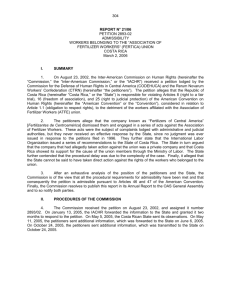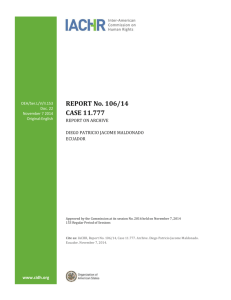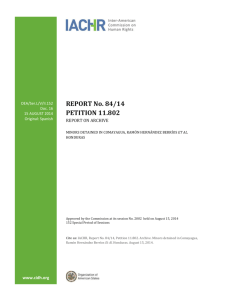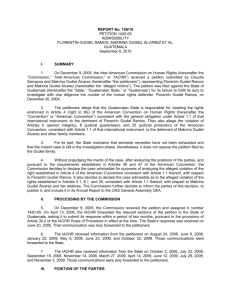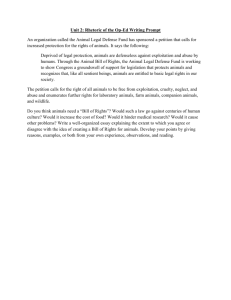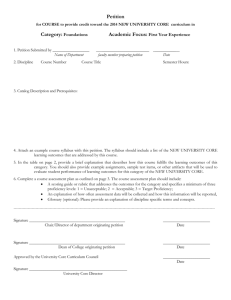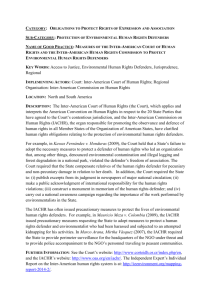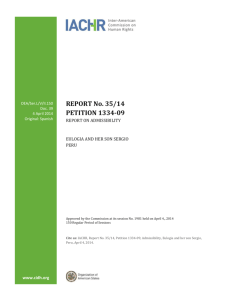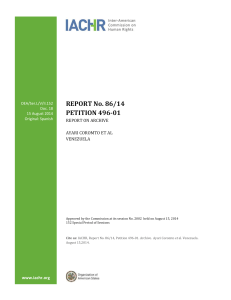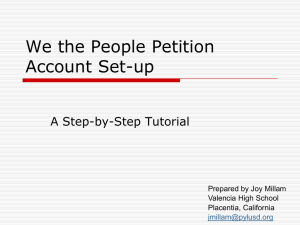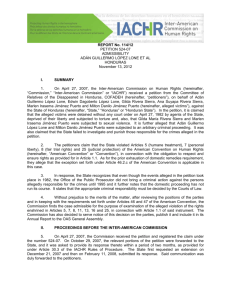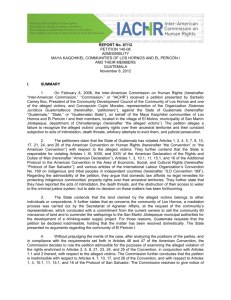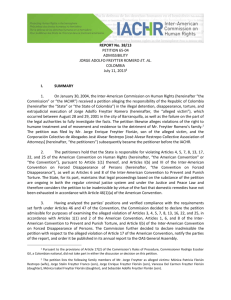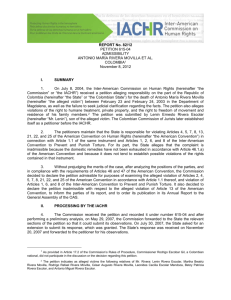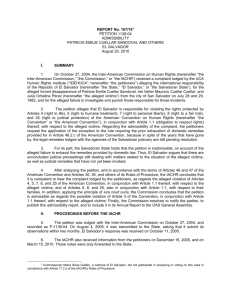Report No. 75/14 - Organization of American States
advertisement
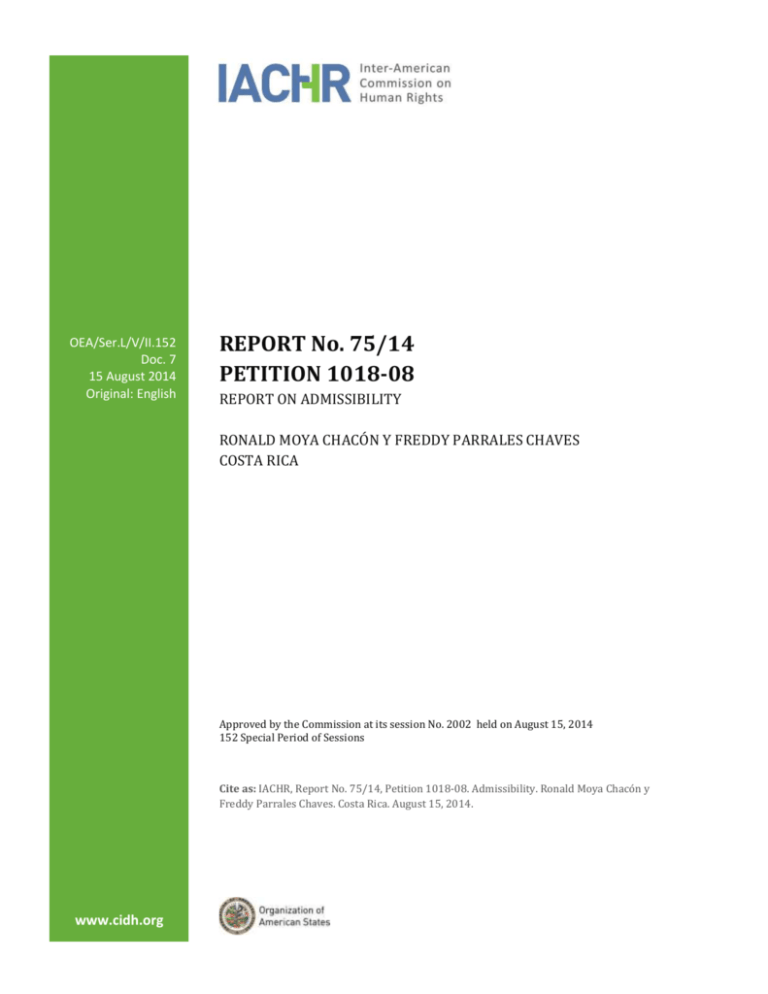
OEA/Ser.L/V/II.152 Doc. 7 15 August 2014 Original: English REPORT No. 75/14 PETITION 1018-08 REPORT ON ADMISSIBILITY RONALD MOYA CHACÓN Y FREDDY PARRALES CHAVES COSTA RICA Approved by the Commission at its session No. 2002 held on August 15, 2014 152 Special Period of Sessions Cite as: IACHR, Report No. 75/14, Petition 1018-08. Admissibility. Ronald Moya Chacón y Freddy Parrales Chaves. Costa Rica. August 15, 2014. www.cidh.org REPORT No. 75/14 PETITION 1018-08 ADMISSIBILITY RONALD MOYA CHACÓN AND FREDDY PARRALES CHAVES COSTA RICA AUGUST 15, 2014 I. SUMMARY 1. On August 29, 2008, the Inter-American Commission on Human Rights (hereinafter the “Commission,” the “Inter-American Commission” or the “IACHR”) received a petition filed by Pedro Nikken and Carlos Ayala Corao (hereinafter the “petitioners”) against the Republic of Costa Rica (hereinafter the “State” or “Costa Rica”). The petitioners alleged that the State is responsible for the violation of the right to freedom of thought and expression, enshrined in Article 13 of the American Convention on Human Rights (hereinafter the “Convention” or the “American Convention”), in conjunction with Articles 1.1 and 2 thereof, to the detriment of journalists Ronald Moya Chacón and Freddy Parrales Chaves of the newspaper “La Nación” (hereinafter “alleged victims”). 2. The petitioners asserted that the alleged victims were found liable for having published information provided by the Ministry of Interior that, nevertheless, had been partially inaccurate. They state that according to the judgment against them, the fact that the information had been provided by a State agency did not excuse the journalists from having to confirm it with other agencies prior to its publication so as to ensure that the information was absolutely accurate before publishing it. In the opinion of the petitioners, this requirement would present a serious obstacle to the free dissemination of news in the public interest. In their opinion, this court decision requires an exorbitant degree of diligence, given that a journalist cannot be required to doubt the official information provided by the State itself, when he or she has even publicly identified the source. They alleged in their petition that what can be required at the time of imposing subsequent liability on journalists is for them to have acted in good faith and used a reasonable degree of diligence. 3. The State alleged that the right in question had not been violated. It stated that the journalists “failed to use the due diligence and reasonable effort expected of a person who is going to publish news in a national newspaper.” In its opinion, this led to an appropriate conviction, which “in no way constitutes prior censorship or creates a deterrent to the exercise of freedom of expression.” The State asked the Commission to find this petition inadmissible because the facts described do not amount to a violation of the human rights protected under the American Convention on Human Rights, and furthermore, because it fails to meet the requirement of exhaustion of domestic remedies. 4. In accordance with Articles 46 and 47 of the American Convention, as well as Articles 30 and 36 of the Rules of Procedure of the IACHR, and after examining the petition without prejudging the merits of the case, the Commission decided to declare the petition admissible with respect to the alleged violation of Articles 13, 8 and 25 of the American Convention, in conjunction with Article 1.1 thereof. The Commission also decided to notify the parties of this decision, publish it, and include it in its Annual Report to the General Assembly of the Organization of American States. II. PROCESSING BY THE COMMISSION 5. The petition was submitted on August 29, 2008 and filed under number 1018-08. On April 29, 2013, the Commission forwarded the pertinent parts to the State, giving it two months to submit its response, in keeping with Article 30(3) of its Rules of Procedure. On June 26, 2013, the State requested a onemonth extension to submit its reply, which it finally sent on August 5, 2013. The State’s response was forwarded to the petitioner on September 26, 2013. 1 III. POSITION OF THE PARTIES A. Position of the petitioners 6. The petitioners alleged that during the month of December 2005, journalist Freddy Parrales, a correspondent for the newspaper “La Nación” in southern Costa Rica, received information that various Police chiefs and officers were under investigation in connection with the smuggling of liquor in the Panamanian border region. They indicated that Mr. Parrales conveyed the aforementioned information to fellow journalist Ronald Moya, his managing editor at “La Nación,” who requested confirmation from Rogelio Ramos Méndez, the then-Minister of Public Safety of Costa Rica. Minister Ramos confirmed the information. 7. The petitioners asserted that, once the information was confirmed, an article entitled “OIJ [Judicial Investigation Department] condemns police chief for failing to stop truck carrying liquor” was published in “La Nación” on December 17, 2005, under the bylines of journalists Moya and Parrales. The article stated that the regional police chief for the southern region, Luis Ortega, had reportedly been subject to investigation for having cleared—for no apparent reason—a truck carrying contraband liquor that had come from Panama. The article also mentioned the existence of “other cases” confirmed by Minister Ramos, adding that “the police chief of San Vito de Coto Brus, whose surname is Cruz, and the police chief of Ciudad Nelly, whose surname is Méndez, are under investigation.” In reference to the aforementioned “Mr. Cruz,” the article stated that “after more than 16 years of service on the Police Force, a case has been brought against Cruz by the Office of the Public Prosecutor of Corredores for alleged extortion in the illegal trafficking of liquor.” 8. The petitioners explained that the Press Office of the Ministry of Public Safety (headed by Minister Ramos) later informed Mr. Moya that the extortion investigation was being conducted by the Office of the Assistant Prosecutor of Coto Brus and not Corredores, as had been reported. They stated that in the February 9, 2006 edition of “La Nación” the respective correction was published as “Errata. Error with regard to the Office of the Public Prosecutor.” 9. The petitioners explained that, as a consequence of the publication described in the above paragraphs, Police Chief José Cruz Trejos Rodríguez filed a criminal complaint for defamation [calumnias y difamación] against journalists Moya and Parrales, as well as Minister Ramos, in which he asserted that there was no open investigation against him for “illegal liquor trafficking.” 10. According to the petitioners, the complaint was adjudicated at the first instance by the Trial Court for the Second Circuit [Tribunal de Juicio de Segundo Circuito]. They asserted that it was proven at trial that the complainant, Mr. Cruz, had in fact been the subject of an investigation that resulted in a criminal charge of extortion, later amended to “bribery of a public official.” They also indicated that only during the trial was it reportedly proven that the investigation did not pertain to “illegal liquor trafficking” but rather to “a vehicle and a person that should have been sent to customs and immigration and apparently an improper payment was made and received.” 11. The petitioners stated that on January 10, 2007, the Trial Court ruled that no crime had been committed, since Messrs. Moya and Parrales did not act with criminal intent, and their “sole intention […] [was to] perform their work of informing the public.” Nevertheless, the journalists were held civilly liable for pecuniary damages, since the Court found that it was not enough for them to have verified the information with the Minister of Public Safety, as “after […] consulting the Minister they should have, in the interest of obtaining sound information, verified the sources and the news, for example, by going to the Press Office of the Judiciary to confirm the details of the criminal case.” 12. The petitioners noted in particular that, even though the matter involved a criminal case initiated by a complaint alleging criminal defamation, and even though that complaint was dismissed, the Court decided to rule autonomously on the civil liability of the criminal defendants. 2 13. The petitioners noted that the judgment was appealed to the Third Division (Criminal Cassation) of the Supreme Court of Justice. In a decision handed down on December 20, 2007, the Third Division upheld the lower court’s judgment. The petitioners stated that this is the only available instance in Costa Rica to challenge these types of decisions. 14. With regard to the alleged violation of Article 13 of the American Convention, the petitioners maintained that although the information published was partially inaccurate, it was proven at trial that the journalists acted in good faith and that their statements were confirmed by reliable sources, including the State’s highest-ranking police authority. They argued that journalists are required to act with an appropriate degree of diligence and professional integrity, which entails a reasonable degree of diligence and which was demonstrated absolutely in this case. In the petitioners’ opinion, “it is one thing to intentionally lie or disseminate lies through an inexcusable omission in the verification of the truth, and it is quite another to disseminate inaccurate or false information whose authenticity was reasonably confirmed.” 15. In short, the petitioners asserted that, under Article 13 of the American Convention, inaccurate information about matters in the public interest cannot give rise to the individual liability of the journalist—even civil liability—when he or she acted in good faith and confirmed the information with credible sources and exercised, as in this case, a reasonable degree of diligence in so doing. 16. The petitioners thus maintained that the facts show that journalists Moya and Parrales published the information in good faith, only after confirming it with an authoritative government source, namely, the Minister of Public Safety. Therefore, they argued that civil liability based on the mere inaccuracy of a news item, as in the instant case, is inconsistent with the American Convention and constitutes an improper restriction on the right to freedom of expression of journalists Ronald Moya and Freddy Parrales. 17. For all of the above reasons, the petitioners asked the Commission to declare the present petition admissible and to adjudicate it. They asked the Commission to issue a report on the merits declaring the State of Costa Rica responsible for violating the right to freedom of expression of Ronald Moya Chacón and Freddy Parrales Chaves, and ordering the State to: (i) set aside the judgments against the defendants; (ii) adopt the international standard on freedom of expression in subsequent cases; (iii) disseminate the decisions of the bodies of the Inter-American Human Rights System as a measure of non-repetition; (iv) pay compensation for the non-pecuniary damages sustained by the petitioners; and (v) compensate the victims for the costs related to the domestic and inter-American proceedings. B. Position of the State 18. The State explained with regard to the facts alleged in this petition that journalists Ronald Moya Chacón and Freddy Parrales Chávez were criminally prosecuted in case No. 06-000003-0538-PE and later found civilly liable in judgment No. 2-2007, handed down by the Trial Court for the Second Circuit of San José on January 10, 2007. The judgment was affirmed by the Third Division of the Supreme Court of Justice, in decision No. 007-01501 of December 20, 2007. 19. The State indicated that “according to the facts on record in the civil judgment entered against them, [journalists] Moya Chacón and Parrales Chávez published an article in the newspaper La Nación in which they expressly stated, among other things, the following: “After more than 16 years of service on the Police Force, a case has been brought against Cruz [in reference to the victim, José Cruz Trejos Rodríguez] by the Office of the Public Prosecutor of Corredores for alleged extortion in the illegal trafficking of liquor.” It added that the falsehood of that information was proven in the civil judgment against the defendants, since “there was no case for illegal liquor trafficking being pursued by any Office of the Public Prosecutor” against the police officer. 20. According to the State, with a modicum of reasonable effort the journalists would have discovered the error and the harm to the public servant’s honor would have been prevented. It maintained that the journalists should not have relied on the information provided by a public servant who supervises 10,000 employees and who is more than 300 kilometers away from where the investigation was being 3 conducted; rather, they should have confirmed the information with other authorities. The State asserted that it is common in Costa Rica for the media to verify their information with the Judiciary—a practice that is shared by La Nación and by the alleged victims. The State maintains that the judgment thoroughly examined the manner in which the news article was composed, in order to conclude “that the news was managed inefficiently, since the article’s headlines, mentioning the involvement of Trejos Rodríguez, misled the readers and seriously tarnished the complainant’s honor.” 21. The State maintained that the judgment against the journalists “follows three clear lines: (i) it punishes the inaccuracy of the information disclosed in the article in question, since the journalists’ work was shown to be insufficient—they were satisfied to request information from the Ministry of Public Safety, which was not the relevant source on the subject being investigated; therefore, the decision stated that they should have availed themselves of another source; (ii) it considers the physical composition of the article to be unprofessional, since the headlines, both the large one and the smaller one, gave readers the false idea that all of the individuals mentioned in the article were under investigation for the offenses reported; and (iii) incidentally, based on inaccurate information, the complainant’s honor was seriously tarnished […].” 22. In the opinion of the State, the alleged victims were found liable civilly—not criminally—and ordered to pay an appropriate sum that does not have a dissuasive, intimidating, or inhibiting effect on the professional practice of journalism. Additionally, the State explained that Article 40 of the Costa Rican Code of Criminal Procedure allows for civil actions to recover damages to be heard within criminal cases, although it acknowledged that such actions are ancillary. In this respect, it maintained that the petitioners’ argument that the trial court had rendered an autonomous decision on the civil liability of the defendants was inaccurate, since the Costa Rican courts entered judgment against the journalists as the result of a civil action filed against them by a public servant. 23. The State underscored that the decisions of the domestic courts adhered to the parameters of necessity, relevance, proportionality, and rationality of subsequent liability, in addition to being fair, and incorporated the applicable standards developed by the inter-American human rights bodies; therefore, the judicial authorities exercised the proper conventionality control. 24. In this regard, the State acknowledged that the alleged victims exhausted the available domestic remedies. Nevertheless, it stated that the allegations made by the petitioners before the InterAmerican System were not made at the domestic level, and therefore the national courts did not have the opportunity to rule on them. It emphasized that all of the arguments asserted at trial focused on convincing the Court that the information reported was true. According to the State, “the petitioners changed their strategy” before the Inter-American Commission, “flagrantly disregarding the procedural fairness and good faith that must prevail in every judicial proceeding and with special care in making use of the international human rights protection bodies.” 25. The State asked that this petition be declared inadmissible on the grounds that the facts described do not constitute a violation of the human rights protected by the American Convention on Human Rights, and furthermore, because the requirement of exhaustion of domestic remedies has not been met in the established terms. IV. ANALYSIS OF ADMISSIBILITY A. Jurisdiction ratione personae, ratione loci, ratione temporis and ratione materiae 26. According to 44 of the American Convention and Article 23 of the Rules of Procedure of the IACHR, the petitioners are entitled to file petitions with the Commission in regard to alleged violations of the rights established in the American Convention. The alleged victims named in the petition are two individuals with respect to whom the State has undertaken to respect and guarantee the rights recognized by the American Convention. As for the State, the Commission notes that Costa Rica has been a State Party to the Convention since August 4, 1970, on which date it deposited its ratification instrument. Therefore, the Commission has jurisdiction ratione personae to examine the petition. 4 27. The Commission has jurisdiction ratione materiae because the petition complains of a violation of human rights protected by the American Convention. In addition, it has ratione temporis insofar as the obligation to respect and guarantee the rights protected in the American Convention were already in force for the State on the date on which the facts alleged in the petition reportedly occurred. The Commission also has ratione loci to adjudicate the petition because the alleged violations of rights protected in the American Convention reportedly took place within the territory of a State Party to that instrument. B. Admissibility requirements 1. Exhaustion of domestic remedies 28. Article 46(1)(a) of the American Convention provides that, in order for a complaint lodged before the Inter-American Commission to be admissible under Article 44 of the Convention, the remedies under domestic law must have been pursued and exhausted in accordance with generally recognized principles of international law. The purpose of this requirement is to allow the national authorities to have knowledge of the alleged violation of a protected right and, if appropriate, have the opportunity to resolve the matter before it is heard by an international body. 29. In the instant case, the petitioners stated that the judgment of the Third Division of the Supreme Court of Costa Rica, which decided the petition for cassation [recurso de casación] on December 20, 2007, exhausted the domestic remedies, since that judgment is not subject to any ordinary appeals under the national laws. They note that under Article 30 of the Constitutional Jurisdiction Act of Costa Rica (Law 7135) no appeal for constitutional relief [amparo] is admissible: “(b) Against court decisions and proceedings of the Judiciary.”1 30. The State acknowledged that the alleged victims had exhausted the remedies available under Costa Rican law to challenge the penalty imposed against them by the court. The IACHR is of the opinion that this point is not in dispute. 31. Nevertheless, the IACHR notes that the State objected to the admissibility of this petition on the grounds that the arguments now being made before the Inter-American Human Rights System were not asserted at the appropriate time before the Costa Rican courts, which prevented them from issuing any rulings with respect thereto. 32. The Inter-American Commission has held, on other occasions, that if the petitioners claim to have exhausted the domestic remedies, the complaint alleging the violation of the American Convention lodged before the IACHR should have been heard and decided by the national courts,2 at least implicitly under the applicable national laws. This guarantees that the State has the opportunity to remedy the alleged violation before it is heard by the bodies of the Inter-American System. 33. In the instant matter, the IACHR finds that there is a reasonable coincidence between the object of the proceeding that was exhausted at the domestic level and the claim submitted by the petitioners before this supervisory body, which concerns the imposition of subsequent liability against the alleged victims for the good faith publication of information confirmed by a government source that offends the personal rights of a public servant and that was inaccurate. The IACHR observes that in the domestic proceedings the courts had the opportunity to rule on the conflict between the fundamental rights that are at odds with each other in this case and on the criteria for resolving that tension—including the degree of diligence and accuracy required of a journalist to avoid subsequent liability—and they did in fact do so, as evidenced by the court decisions on record in the case file. It bears repeating that, for purposes of the 1 Article 30 of the Constitutional Jurisdiction Act of Costa Rica establishes that “An appeal for constitutional relief [amparo] shall not be admissible: […] (b) Against court decisions and proceedings of the Judiciary.” 2 See IACHR, Report No. 67/01, Tomás Enrique Carvallo Quintana (Argentina), June 14, 2001, para. 56 5 admissibility of a petition, it is enough for the substance of the complaint lodged before the IACHR to have been examined at the domestic level. 34. Therefore, the Commission finds that the requirement to exhaust domestic remedies has been satisfied in accordance with Article 46(1)(a) of the American Convention. 2. Filing deadline for the petition 35. Article 46(1)(b) of the American Convention establishes that all petitions must be filed within six months of the date on which the petitioner was given notice of the final judgment that exhausted the domestic remedies. Given that the alleged victims received notice of the final judgment on March 7, 2007, and the complaint was submitted to the IACHR on August 29, 2007, the Commission concludes that the deadline stipulated in the abovementioned provision of the Convention was met. 2. Duplication of proceedings and international res judicata 36. Articles 46(1)(c) and 47(d) establish that the admission of a petition is conditioned on the requirement that the matter “is not pending in another international proceeding for settlement” and that the petition is not “substantially the same as one previously studied by the Commission or by another international organization.” There is nothing on record to indicate that this petition is pending in another international proceeding. Furthermore, the Commission has not received any information to indicate the existence of such a situation or that the complaint duplicates a previously examined petition or communication. Accordingly, it finds that the requirements of Articles 46(1)(c) and 47(d) of the Convention have been met. 3. Characterization of the alleged facts 37. The Inter-American Commission must determine whether the facts described in the petition amount to violations of rights enshrined in the American Convention, according to the requirements of Article 47(b), or whether the petition, under Article 47(c), must be rejected for being “manifestly groundless” or “out of order.” At this stage in the proceedings, the IACHR must perform a prima facie evaluation, not for purposes of establishing alleged violations of the American Convention, but rather in order to examine whether the petition complains of acts that could potentially amount to violations of rights guaranteed in the American Convention. This examination does not entail prejudgment or an advance opinion on the merits of the case.3 38. Neither the American Convention nor the IACHR’s Rules of Procedure require the petitioner to identify the specific rights alleged to have been violated by the State in the matter brought before the Commission, although the petitioners may do so. It is the responsibility of the Commission, based on the case law of the system, to determine in its admissibility reports which provision of the relevant Inter-American instruments is applicable or may have been violated, if the facts alleged are proven by sufficient evidence. 39. The petitioners asserted that the imposition of a penalty against two journalists who published information duly substantiated by a government source regarding a matter in the public interest violates Article 13 of the American Convention. 40. The State, for its part, maintained that the decisions of the domestic courts adhered to the applicable standards developed by the inter-American human rights bodies and that the judicial authorities therefore exercised the proper conventionality control. 41. On this point, it bears repeating that the Inter-American Commission has jurisdiction to declare a petition admissible and to rule on its merits when it concerns a decision rendered by a national 3 52. IACHR, Report No. 21/04. Petition 12.190. Admissibility. José Luís Tapia González et al. Chile. February 24, 2004. Paras. 33 & 6 court that, as alleged, could substantially affect a right guaranteed by the American Convention.4 In this case, the IACHR observes that the object of this petition is to determine whether the penalty imposed by the Costa Rican tribunals against the alleged victims satisfies the relevant requirements set forth in the American Convention. 42. In view of the legal and factual evidence presented and the nature of the matter before it, the IACHR finds it necessary to examine at the merits phase of this case the possible violation of Articles 13, 8 and 25 of the American Convention, in relation to the general obligation established in Article 1.1 of the Convention. 43. In conclusion, the IACHR decides that the petition is neither “manifestly groundless” nor “out of order,” and therefore finds that the petitioner has prima facie met the requirements contained in Article 47(b) of the American Convention in relation to potential violations of the rights enshrined in Articles 13, 8 and 25 of the American Convention, read in conjunction with Article 1.1 thereof, to the detriment of journalists Ronald Chacón Chaverri and Freddy Parrales Chaves. V. CONCLUSION 44. The Commission concludes that it has jurisdiction to hear this petition and that the petition meets the admissibility requirements established in Articles 46 and 47 of the American Convention, as well as in Articles 30, 36, and other consistent articles of its Rules of Procedure. Based on the factual and legal arguments presented above and without prejudging the merits of the case, THE INTER-AMERICAN COMMISSION ON HUMAN RIGHTS DECIDES: 1. To declare this petition admissible with regard to Articles 13, 8 and 25 of the American Convention, in connection with Article 1.1 thereof. 2. To provide notice of this decision to the State and to the petitioners. 3. To continue with the analysis of the merits of the case. 4. To publish this decision and include it in the Annual Report to the General Assembly of the OAS. Approved by the Inter-American Commission on Human Rights in the city of Mexico on the 15th day of the month of August, 2014. (Signed): Tracy Robinson, President; Rose-Marie Belle Antoine, First Vice-President; Felipe González, Second Vice President; José de Jesús Orozco Henríquez, Rosa María Ortiz, Paulo Vannuchi and James L. Cavallaro, Commissioners. 4 See IACHR, Report No. 32/07, Petition 452-05. Juan Patricio Marielo Saravia et al. (Chile), May 2, 2007, para. 57; Report No. 1/03, Case 12.221, Jorge Omar Gutiérrez (Argentina), February 20, 2003, para. 46, citing Report No. 39/96, Case 11.673, Marzioni, Argentina, October 15, 1996, paras. 50-51. See, IACHR, Report No. 4/04, Petition 12.324, Rubén Luis Godoy (Argentina), February 24, 2004, para. 44. 7

